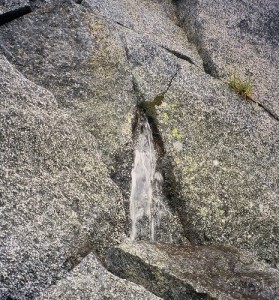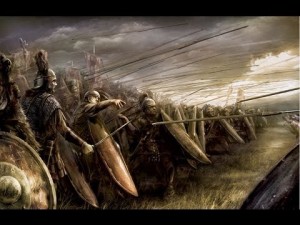Getting into unknown territory…..
 So the water runs out and the people turn on Aaron and Moses. Moses’ sister Miriam has died. The people wish that they had never left Egypt. They blame Aaron and Moses for leading them where there is nothing to eat and drink.
So the water runs out and the people turn on Aaron and Moses. Moses’ sister Miriam has died. The people wish that they had never left Egypt. They blame Aaron and Moses for leading them where there is nothing to eat and drink.
Moses and Aaron fall face down before God. God tells Moses to hit a rock with his staff. Moses does it and water comes gushing out.
Doesn’t this sound very familiar? Haven’t we heard all this before?
Well, yes. And no.
There’s an interesting twist. After Moses and Aaron have done exactly what God commanded, this is what God says –
“Because you did not trust in me enough to honour me as holy in the sight of the Israelites, you will not bring this community into the land I give them.” Numbers 20:12
So Moses and Aaron are sentenced to never entering the Promised Land, just like their contemporaries.
Why? What have they done wrong?
Well, it appears it is all about trust.
They did not trust in God enough.
They did not trust in God enough to honour him as holy.
They did not trust in God enough to honour him as holy in the sight of Israelites.
I’m wondering if it’s all about the language they use. If the reported speech is actually accurate and these are the words Moses used, the we can observe a shift in emphasis.
The first time that this happened, as reported back in Exodus 17, Moses says –
“Why do you quarrel with me? Why do you put the Lord to the test?” Exodus 17:2
He begs God for help –
“What am I to do with these people? They are almost ready to stone me.” Exodus 17:2
When water does come from the rock –
And he called the place Massah and Meribah because the Israelites quarreled and because they tested the Lord saying, “Is the Lord among us or not?” Exodus 17:7
He recognises this grumbling for what it is – a test for the Lord. The people have forgotten who God is. They have lost the ability to trust in the God who provides.
But he still trusts. He knows only God can help him provide for the people. He knows that he is only a channel for God’s power and mighty provision.
This time it is different. This time all he says is –
“Listen, you rebels, must we bring you water out of this rock?” Numbers 20:10
Think about what he has missed out. No mention of God. No reminder of what God has done for them and how he has promised to provide.
This time, it’s all about him (and Aaron).
Imagine the emphasis – must we bring you water out of this rock? Really? You need us to fix it for you?
Moses appears to have slipped into feeling that it is he that is responsible for the people. That he alone has to fix everything. That he has all the answers. And all the glory. He is important. He is indispensable.
Is this why God says he has not trusted him enough to honour him as holy in the sight of Israelites. He has not pointed out God’s role in all of this. He has not brought the Israelites’ lack of trust in their God to their attention. He has simply highlighted their dependence on him – Moses, their leader, their provider.
 You don’t need me to spell out the relevance of all this to our day and age. The danger of believing your own publicity. The consequences of becoming confident in your own success and talents and forgetting where they have come from. Of becoming comfortable on your pedestal. Of taking all the glory. Of making others believe you are indispensable. That you are the only one who can do this job. That they would be lost without you.
You don’t need me to spell out the relevance of all this to our day and age. The danger of believing your own publicity. The consequences of becoming confident in your own success and talents and forgetting where they have come from. Of becoming comfortable on your pedestal. Of taking all the glory. Of making others believe you are indispensable. That you are the only one who can do this job. That they would be lost without you.
The danger of forgetting God’s role in your life. Of not honouring God for what he has done with you and for you. Of not trusting God enough and relying on him, but believing you know how to take it from here.
We’ve seen it happen time and time again. We’ve probably done it ourselves. Moses fell into this trap and look where it got him – not to the Promised Land, that’s for sure.
By the next recorded incident, Moses seems to have learnt his lesson and restored perspective. God is in his rightful place in his thinking and language again –
Moses sent messengers from Kadesh to the king of Edom, saying:
“This is what your brother Israel says: You know about all the hardships that have come on us. Our ancestors went down into Egypt, and we lived there many years. The Egyptians mistreated us and our ancestors, but when we cried out to the Lord, he heard our cry and sent an angel and brought us out of Egypt.” Numbers 20:14 -16
Moses is requesting safe passage through his land. The Israelites will stick to the path and not take anything from the land. But they are not allowed to pass through. So they have to go round a different way.
It happens.
And then Aaron dies. His priestly garments are taken from him and put on his son Eleazar, just as God has commanded.
The next chapter starts with a weird little bit that I will include but not really comment on, other than to say the Israelites are now talking to God and recognising his power and trusting him for his strength and support –
When the Canaanite king of Arad, who lived in the Negev, heard that Israel was coming along the road to Atharim, he attacked the Israelites and captured some of them. Then Israel made this vow to the Lord: “If you will deliver these people into our hands, we will totally destroy their cities.” The Lord listened to Israel’s plea and gave the Canaanites over to them. They completely destroyed them and their towns; so the place was named Hormah. Numbers 21:1-3
 The next little bit is significant. The people moan again -what a surprise! – and God sends venomous snakes among then to bite them. But God then tells Moses to make a bronze snake and lift it up on a pole. Anyone who looks at the snake will live.
The next little bit is significant. The people moan again -what a surprise! – and God sends venomous snakes among then to bite them. But God then tells Moses to make a bronze snake and lift it up on a pole. Anyone who looks at the snake will live.
Yes, there is judgment, but there is always a way back.
As it was then, so it is now –
Just as Moses lifted up the snake in the wilderness, so the Son of Man must be lifted up, that everyone who believes may have eternal life in him. John 3:14-15
There is judgment, but there is always a way back.
The Israelites then travel around plenty and this time, God offers them water before they start moaning for it. This causes them to sing a song – not a great song, but maybe the first steps towards praise and worship!
 And now we get into the kind of territory that most of us do everything we can to avoid. Where God appears to allow the slaughter of tens of thousands of people. A God of war and destruction. How does this fit with the image of a loving God?
And now we get into the kind of territory that most of us do everything we can to avoid. Where God appears to allow the slaughter of tens of thousands of people. A God of war and destruction. How does this fit with the image of a loving God?
I don’t know.
Moses asks the king of the Amorites if the Israelites can pass through the land and this time, when he says no and attacks the Israelites, the Israelites fight back. They push the armies back and capture their cities and occupy them. This is written about in the poetry of the time that is quoted here in the Bible.
This wasn’t enough. The Israelites then continued up the road to Bashan to fight again. God is with them and will secure the victory –
“Do not be afraid of him, for I have delivered him into your hands, along with his whole army and his land. Do to him what you did to Sihon king of the Amorites, who reigned in Heshbon.” Numbers 21:34
The Israelites kill the whole army, leaving no survivors and take control of the land.
I will make no attempt to draw any conclusions from this because I don’t know. I simply do not know. I am no historian or Bible scholar. I have no understanding of the context. I don’t know what this says about God. But I do trust that He was doing what was required in that time and place and that I do not need to understand everything to trust in this God. In fact, isn’t that what trust is all about? There are plenty of things we don’t understand but we can still trust. Trust that only God can see the bigger picture – the whole picture in fact.












